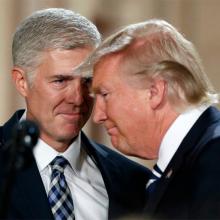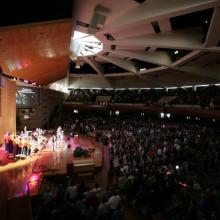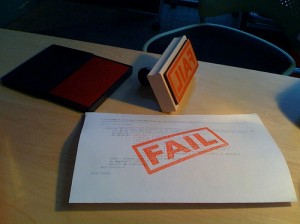justice antonin scalia
It may take years to fully grasp the import of the Supreme Court’s decision in Trinity Lutheran Church v. Comer, where the court ruled 7-2 that the state of Missouri had expressly and unjustifiably discriminated against a church by disqualifying it from receiving a public benefit (scrap tire to enhance playground safety) solely because of the church’s religious character.
But here are six initial observations about the ruling:
The Justice Department asked the Supreme Court to break its losing streak in lower courts and revive President Trump’s travel ban on immigrants from six predominantly Muslim nations.
The request came on June 1 in three separate petitions to courts in Richmond, Va., and San Francisco that blocked the president’s executive order barring most immigrants from countries deemed at risk for terrorism, as well as international refugees.
A federal appeals court in Richmond has delivered yet another blow to President Trump’s effort to institute a travel ban targeting six majority-Muslim countries, making a final Supreme Court showdown more likely.
The full U.S. Court of Appeals for the 4th Circuit ruled 10-3 on May 25 to uphold a lower court’s decision that barred the Trump administration from implementing its second attempt at the travel ban.
President Donald Trump had promised last week evangelical Christians would “love” his nominee for the Supreme Court.
And in fact, said evangelical author and president of The KAIROS Company Johnnie Moore, a member of Trump’s evangelical advisory board, “Evangelicals are ecstatic.”
On Jan. 31, Trump nominated Neil Gorsuch to fill the open seat on the Supreme Court left by the unexpected death of Justice Antonin Scalia nearly a year ago.

Sri Srinivasan. Image via Reuters/RNS
Hindus around the world are wondering whether Sri Srinivasan — the name atop many a list of potential U.S. Supreme Court nominees — will be the first Hindu to serve on the high court. The India-born Srinivasan put his hand on the Hindu holy book, the Bhagavad Gita, held by his mother, when he was sworn in to the U.S. Court of Appeals for the District of Columbia Circuit in 2013. The Senate had confirmed him to the court — often a launching pad to the Supreme Court — by a 97-0 vote.

Justice Antonin Scalia with Cardinal Donald Wuerl. Image via REUTERS/Benjamin Myers/RNS
Supreme Court Justice Antonin Scalia’s funeral will be held Feb. 20 at the Basilica of the National Shrine of the Immaculate Conception, the largest Roman Catholic church in North America, according to media reports. The late justice will lie in repose at the Supreme Court on Feb. 19, following in a tradition last observed after the death of Chief Justice William Rehnquist in 2005.
The U.S. Supreme Court on Monday let stand a lower court ruling that a Wisconsin high school acted unconstitutionally when it held its graduation ceremonies in a local megachurch.
As is their custom, the justices did not give a reason for declining to hear a challenge to the 7th Circuit ruling.
Monday’s decision may be a signal by the court that despite its approval of sectarian prayers at public meetings in the Town of Greece v. Galloway decision in May, it draws the line at exposing children to religious symbols when they have not choice about it.
The Supreme Court struggled Wednesday with a case that asks whether government bodies can open with prayers that some people find overly religious and excluding.
From their lines of questioning, it’s unclear whether the court is ready to write new rules on what sort of prayer falls outside constitutional bounds. And more than one of the justices noted that just before they took their seats, a court officer declared: “God save the United States and this honorable court.”
Few court watchers believe the justices will rule all civic prayers unconstitutional — the nation has a long history of convening legislative bodies with such language.
Rather, the question raised by Town of Greece v. Galloway is how sectarian these prayers can get.
Sometimes a court opinion is more than just a court opinion.
Justice Anthony Kennedy’s 26-page decision Wednesday striking down a federal ban on same-sex marriages offers a window into Americans’ rapidly shifting views of same-sex relationships — a shift that increasingly relies on matters of law and fairness, not moral or religious views.
At the same time, Justice Antonin Scalia’s biting 26-page dissent in United States v. Windsor reflects a set of cultural, religious, and social arguments that are losing ground in the court of public opinion and now, in the highest court of the land.
I had invited one of our regular bloggers to comment on the "desert cross" controversy--a Supreme Court case deciding the appropriateness of a cross erected on Mojave National Preserve to honor World War I dead.






